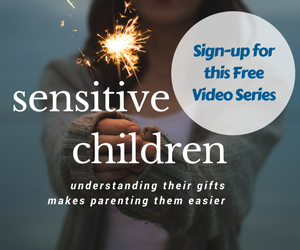5 Ways to Strengthen Your Relationship & Empower Your Kids

When you become a parent, a light inside is awakened, and you are charged with the responsibility of illuminating the path for your children until they are old enough to hold the light for themselves.
You shine it on the shadow parts so they can be seen, heard and transformed.
You light up the scary and unknown with empathy, awareness, and understanding.
But what happens when the light is dimmed by your own stress or when the guidepost is not readily available, steady enough or held high enough?
What happens when the light is unexpectedly extinguished in fear or erratically bursts into flames, unrestrained, engulfing your children?
Guidance has a way of beckoning growth or destroying it.
I recently read an article in the Washington Post about a county in the state of Washington with a high rate of teen suicides.
"After six Woodson High suicides, a search for solace and answers."
One fifteen year old left a note. “There is too much stress in my life from school and the environment it creates, expectations for sports, expectations from my friends and expectations from my family,” he wrote. He ended with a simple: “Goodbye.”
"The suicides have been especially baffling because many of the teens did not seem to exhibit the factors that would put them at risk. They had good grades, stable families and excelled at sports."
Stable families. I think we need to redefine the meaning of stable.
By all visible accounts, I grew up in a stable, two-parent, upper-middle-class family with privilege, community, and supportive resources. However, those supportive resources only work when the pain is visible, when we recognize in our children the silent behaviors that signal stress, and when we allow them to voice their frustration without blame, shame, judgment or guilt.
The signs of stress are not always negative or apparent. Perfectionist, dutiful, friendly kids with good grades and bright futures are suffering in silence.
I know because I once was one of those kids.
When you walked through the front doors of my attractive, suburban childhood home, we looked stable, even normal. But by 12, I was fantasizing about my death, and by 19, I was trying it on for size.
Why?

I had “loving parents” who expected me to keep up with my responsibilities, get good grades and go to college. And in return, they afforded me access to private schools and every possible lesson imaginable from art to sports to music.
And yet, by fifth grade, I was
writing my own suicide notes and fantasizing about death by writing
about the grief I felt unable to express.
"It was just a joke, a story I was writing," I swore up and down after my teacher, who found the note in my desk, shared it with my mother and step-father. I was cornered. I screwed-up again.
I had frightened and disappointed everyone I loved.
There was no way I was going to tell them how I really felt. I had no assurance that my pain would not give rise to more worry, misunderstanding, shame, and blame. I wanted to avoid the constant questions about “what was wrong” because I could not definitively answer.
Inquiring about my inner world was not allowed. I would not share those awful things with anyone. I did not know what was wrong, but I knew that it was my fault.
Me.
I am the problem.
I can’t keep up.
I am not good enough.
I make everyone angry.
I cause them to worry.
I need to change.
Collaborative problem-solving it was not, but I was operating from survival, feeling isolated and embarrassed.
Was I responsible for this?
Could I really be the cause of my own undoing?
This was the internal dialogue that I carried with me for years because I didn’t think it was safe to express what was happening to me. Therefore, every action was seeded with the belief that I was unworthy and incapable.
Now that I am a parent, I see how difficult it can be to hold the light for our kids and give them the time and space to feel and process their experiences and emotions without judgment or an iron-fist to control the outcome.
It is not easy, but it is necessary.
When I voiced my upset, I was told to "get over it" and "stop being a baby."
When I shared my disagreement, I was rebuked for “challenging authority.”
When I expressed my hopes and dreams, I was told to "be realistic" and “stop being ridiculous.”
When I showed my overwhelm through aggression, I was told to “shape up or ship out.”
When I argued my point, I was shut down and expected to "behave or suffer the consequences.”
When I made poor decisions, I heard "I'm so disappointed in you."
Failure is a natural and normal part of growing up, but in my house, it seemed to represent a breach of mutual respect. Anything less than my best was intolerable.
Striving for “perfection” and “achievement” is hurting our kids.

Here are five ways you can build resilience in your kids, strengthen your relationship, and provide your children with the coping skills they need to manage their lives.
1. Listen without advising.
When your child comes to you with a conflict or problem, listen for the pain and unmet needs, instead of trying to fix, advise, or counsel your child.
When you hear, “I hate school. It’s so boring.”
Try something like: “It must be difficult to pay attention when you’re not interested in the subject.” Or “You probably don’t like having to sit at a desk all day long.”
2. Reflect without judgment.
Instead of making excuses, solving problems, or distracting your child from his feelings, reflect what you hear without evaluation, assumption, or interpretation.
Continuing with the previous example…
Try something like: “It sounds like there are some things that you’re interested in learning about which aren’t covered in school.” Or, “Tell me more. This is important.”
3. Guide without control.
Once you know what your child is feeling and needing, your instinct might be to direct her toward a solution, but you will be much more influential if you can shine a strong and steady light to help your child develop the capacity for self-reflection.
Instead of engaging your child as a boss or authority figure, connect with the intention to lead your child to her own solutions.
Try something like: “What do you think gets in your way of engaging with your teacher and this subject?” Or, “What is the most difficult part of the school day?”
4. Problem-solve without contempt.
It is not always easy to hold the space for solutions to emerge. It would be much easier to tell your child what to do and how to do it and then nag him until he gets it right. This is parenting from fear and breeds contempt in you both when your child doesn’t “do what you suggest.”
Try something like: “I know this is difficult for you. I’m not sure that is how I would handle it, but I’m here for you.” Or, “You might have to try a few different things before you feel better about this. I trust your decision.”
5. Respect without rejection.
When your child doesn’t follow your suggestions or advice, it can feel like defiance or even an act of disrespect. You may think, “I told you what to do! Why don’t you ever listen to me?”
Feeling disrespected, you may be triggered into rejecting, isolating or punishing your child. However, demanding obedience or respect from your child by dismissing her attempts to be heard, or try things her own way, will only backfire in the long-run.
Try something like: “I respect your decision to try what works for you.” Or, “I’m not sure I understand, but you won’t know until you try.”
Children learn more about themselves and are better able to meet your expectations and positively direct their lives when you use the power of your relationship to light their path, rather than the force of your will.
Creating strong relationships requires you to step outside of your ego long enough to let your children have their own experience, without projecting onto them your past or your fears of the future.
When you do, you will become a trusted source of influence and support and not additional stress which they struggle to manage.
Thanks so much for reading and please remember, it's about being conscious - not perfect!
Talk soon,
Lori
LIKE what you see? SHARE it with someone you LOVE!

